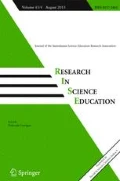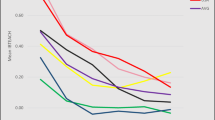Abstract
This paper addresses the question of how to develop prospective teachers' pedagogical content knowledge (PCK) in science teacher education. The main focus is on the knowledge transformation process and on the cognitive strategies used to shift prospective teachers' explanations within the domain of modelling thermal physical phenomena. This study investigates the development of PCK within a group of 28 pre-service physics teachers during the first semester of their two-year post-graduate teacher education program. It focuses on the central issue of the relationships between observable phenomena, like macroscopic thermal properties of matter and their interpretation and/or explanation in terms of corpuscular characteristics and/or thermodynamics theory. The strategy is based on the consideration that knowledge transformation is not a one-way process from subject matter knowledge to pedagogical content knowledge, as literature suggests, but a bidirectional process involving deepening of subject matter knowledge and increasing awareness of pedagogical issues.
Similar content being viewed by others
References
Aiello-Nicosia, M. L., & Sperandeo-Mineo, R. M. (2000). Educational reconstruction of the physics content to be taught and pre-service teacher training. International Journal of Science Education, 22, 1085–1097.
Clement, J. (2000). Model based learning as a key research area for science education. International Journal of Science Education, 22, 1041–1053.
Dillon, C. (1994). Qualitative reasoning about physical systems – an overview. Studies in Science Education, 23, 39–57.
Duit, R., & Komorek, M. (1997). Understanding the basic ideas of chaos theory in a study of limited predictability. International Journal of Science Education, 19, 247–264.
Duit, R., Roth, W. M., Komorek, M., & Wilbers, J. (1998). Conceptual change cum discourse analysis to understand cognition in a unit on chaotic systems: Towards an integrative perspective on learning in science. International Journal of Science Education, 20, 1059–1073.
Engel-Clough, E., & Driver, R. (1985). Secondary students' conceptions of conduction of heat: Bringing together personal and scientific views. Physics Education, 69, 176–182.
Flavell, J. (1979). Metacognition and cognitive monitoring. A new area of cognitive development inquiry. American Psychologist, 34, 906–911.
Gentner, D., & Stevens, A. L. (1983). Mental models. London: Lawrence Erlbaum.
Giere, R. (1990). Explaining science: A cognitive approach. Chicago: University of Chicago Press.
Gilbert, J. K., Boulter, C., & Rutherford, M. (1998). Models in explanations: Part 1, horses for courses? International Journal of Science Education, 20, 83–97.
Hestenes, D. (1992). Modelling games in the Newtonian world. American Journal of Physics, 60, 732–748.
Linder, C. J., McIntyre, C. L., Marshall, D., & Nvhodu, M. R. (1997). Physics tutors' metalearning development through an extension of Schön's reflective practice. International Journal of Science Education, 19, 821–833.
Lijnse, P. (1995). Developmental research as a way to an empirically based ‘didactical structure of the science. Science Education, 79, 189–199.
Linn, M. C., & Songer, N. (1991). Teaching thermodynamics to middle school students: What are appropriate cognitive demands? Journal of Research in Science Teaching, 28, 885–918.
Loughran, J., Milroy, P., Berry, A., Gunstone, R., & Mulhall, P. (2001). Documenting science teachers' pedagogical content knowledge through pap-ers. Research in Science Education, 31, 289–307.
Magnusson, S., Krajcik, J., & Borko, H. (1999). Nature, sources and development of pedagogical content knowledge. In J. Gess-Newsome & N. G. Lederman (Eds.), Examining pedagogical content knowledge (pp. 95–132). Dordrecht, The Netherlands: Kluwer.
Marton, F. (1988). Describing and improving learning. In R. R. Schmeck (Ed.), Learning strategies and learning styles (pp. 53–82). New York: Plenum.
Marton, F., & Booth, S. (1997). Learning and awareness. Mahwah: Lawrence Erlbaum.
McKinnon, A. M., & Erickson, G. L. (1988). Taking Schön's ideas to a science teaching practicum. In P. P. Grimmet & G. L. Erickson (Eds.), Reflection in teacher education (pp. 125–141). New York: Teacher College Press.
Mellado, V. (1998). The classroom practice of preservice teachers and their conceptions of teaching and learning science. Science Education, 82, 197–214.
National Research Council. (1996). National science education standards. Washington, D.C.: National Academy Press.
Niess, M. L., & Scholz, J. M. (1999). Incorporating subject matter specific teaching strategies into secondary science teacher preparation. In J. Gess-Newsome & N. G. Lederman (Eds.), Examining pedagogical content knowledge (pp. 257–276). Dordrecht, The Netherlands: Kluwer.
Posner, G. L., Strike, K. A., Hewson, P. W., & Gertzog, W. A. (1982). Accommodation of a scientific conceptions: Toward a theory of conceptual change. Science Education, 66, 211–227.
Raghaven, K., & Glaser, R. (1995). Model based analysis and reasoning in science: The MARS curriculum. Science & Education, 79, 37–62.
Resnick, L. B. (1987). Learning in school and out. Educational Researcher, 16(9), 13–20.
Rozier, S., & Viennot, L. (1991). Students' reasoning in thermodynamics. International Journal of Science Education, 13, 159–170.
Scardamalia, M., Bereiter, C., & Lamon, M. (1996). The CSILE project: Trying to bring the classroom into world 3. In K. McGilly (Ed.), Classroom lessons: Integrating cognitive theory and classroom practice (pp. 201–228). Cambridge, MA: The MIT Press.
Schecker, H. (1993). Learning physics by making models. Physics Education, 28, 102–106.
Schoenfeld, A. H. (1987). What's all the fuss about metacognition? In A. H. Schoenfeld (Ed.), Cognitive science and mathematics education (pp. 189–215). Hillsdale, NJ: Erlbaum.
Schön, D. A. (1988). Coaching reflective thinking. In P. P.Grimmet & G. L. Erickson (Eds.), Reflection in teacher education (pp. 113–137). New York: Teacher College Press.
Shulman, L. S. (1986a). Paradigms and research programs in the study of teaching: A contemporary perspective. In M. C. Wittrock (Ed.), Handbook of research on teaching (3rd ed., pp. 3–36). New York: Macmillan.
Shulman, L. S. (1986b). Those who understand: Knowledge growth in teaching. Educational Researcher, 15(1), 4–14.
Shulman, L. S. (1987). Knowledge and teaching: Foundations of the new reform. Harvard Educational Review, 57(1), 1–22.
Shymansky, J. A., Woodworth, G., Norman, O., Dunkhase, J., Matthews, C., & Liu, C. T. (1993). A study of changes in middle school teachers' understanding of selected ideas in science as a function of an in-service program focusing on student preconceptions. Journal of Research in Science Teaching, 30, 737–755.
Simons, P. R. J. (1996). Metacognitive strategies: Teaching and assessing. In L. W. Anderson (Ed.), International encyclopaedia of teaching and teacher education (pp. 325–342). Oxford: Elsevier Science.
Sprinthall, N. A., Reiman, A. J., & Thies-Sprinthall, L. (1996). Teacher professional development. In J. Sikula (Ed.), Second handbook of research on teacher education (pp. 667–703). New York: Macmillan.
Stake, R. E. (1995). The art of case study research. Thousand Oaks, CA: Sage.
Stake, R. E. (2000). Case studies. In N. K. Denzin & Y. S. Lincoln (Eds.), Handbook of qualitative research (pp. 435–454). Thousand Oaks, CA: Sage.
Strauss, A. L., & Corbin, J. (1990). Basics of qualitative research: Grounded theory procedures and techniques. Newbury Park, CA: Sage.
Tiberghien, A., Jossem, E. L., & Barojas, J. (1998). Connecting research in physics education with teacher education. (International Commission on Physics Education Book: http://www.physics.ohio-state.edu/~jossem/ICPE/TOC.html)
van Driel, J., De Jong, O., & Verloop, N. (2002). The development of pre service chemistry teachers' pedagogical content knowledge. Science Education, 86, 572–590.
Viennot, L. (1996). Raisonner en physique, la part du sens commun. Bruxelles: De Boeck.
von Glasersfeld, E. (1994). Questions and answers about radical constructivism. In K. Tobin (Ed.), The practice of constructivism in science education (pp. 18–27). Hillsdale, NJ: Lawrence Erlbaum.
Watts, M., & Jofili, Z. (1998). Toward critical constructivistic teaching. International Journal of Science Education, 20, 159–170.
White, B. Y., Shimoda, T. A., & Fredericksen, J. R. (1999). Enabling students to construct theories of collaborative inquiry and reflective learning: Computer support for metacognitive development. International Journal of Artificial Intelligence in Education, 10(2), 151–182.
Zeidler, D. L. (2002). Dancing with maggots. Journal of Science Teacher Education, 13(1), 27–42.
Zuckerman, J. T. (1999). Student science teachers constructing practical knowledge from inservice science supervisors' stories. Journal of Science Teacher Education, 10(3), 235–245.
Author information
Authors and Affiliations
Corresponding author
Rights and permissions
About this article
Cite this article
Sperandeo-Mineo, R.M., Fazio, C. & Tarantino, G. Pedagogical Content Knowledge Development and Pre-Service Physics Teacher Education: A Case Study. Res Sci Educ 36, 235–268 (2006). https://doi.org/10.1007/s11165-005-9004-3
Received:
Accepted:
Published:
Issue Date:
DOI: https://doi.org/10.1007/s11165-005-9004-3




